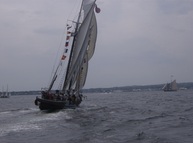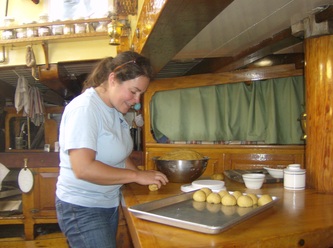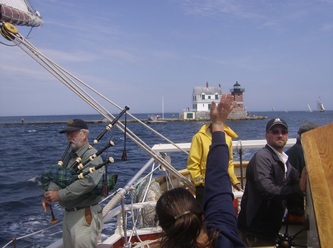 Earlier this month, I described what it was like to to spend a day on an 140-year-old schooner as it raced against another old girl. I'm reposting this excellent article by Maine writer Eva Murray, author of Well Out To Sea, as she describes with much more detail the exhilarating ride we all took. In short: it was a blast! Earlier this month I was fortunate to be invited along for an extraordinary boat ride. On a warm sunny day in mid-June the two oldest working schooners in Maine, and in America, undertook a friendly race from Camden to Rockland in honor of their 140th birthdays. The historic schooners Stephen Taber, based in Rockland, and Lewis R. French, of Camden had planned a birthday party. A bunch of us piled into a shuttle van to Camden, including a few guys who work for the City of Rockland and a couple of friendly regular tourists who’ve sailed on the two vessels before. The wife of the captain of the French was providing some of the history of the schooners, how in their day they hauled “everything…Christmas trees, sardines, bricks, lime....” As we boarded the Taber from the yawl boat that carried us from the Camden dock, Captain Ken Barnes, previous master of the Taber, stood on the deck and played his bagpipes. Soon, coffee and cake appeared from the galley. Aboard were most of the living former captains of the Taber, including Orville Young, Jim Sharp of the Sail Power and Steam Museum in Rockland, Ken and Ellen Barnes, owners of the Captain Lindsey House Inn also in Rockland, and presumed future captain Oscar, age two, who is messing with the parallel rules. His grandmother Ellen shows him the chart. I am close enough to overhear much of the talk on the marine radio between the captains of the two contestants. “I guess I’d better call Garth and ask him where the starting line is.” Captain Noah keys the mike: “Hey…so what’s the starting line?” Oscar toddles up to him and asks, “Are we going to race?” On the VHF: “This is the Stephen Taber to the Racing Schooner Lewis R. French…” Both captains have their little boys aboard. Oscar announces to everybody that this is a fast boat. A bit more of a work-boat person myself, I feel a tad self-conscious mixing with this sailboat crowd. I don’t speak the language, wear the usual clothing or know how to work the gear. I will endeavor to stay out of the way. As the last boat load of guests is finally aboard the schooner and Captain Noah Barnes gives us the safety lecture, he tells us point blank, “You are all, as a rule, in the way. That’s OK.” “By the way,” he adds, “I might be firing a cannon from time to time…probably at the Lewis R. French….” He pointed out the hot Charlie Noble smokestack sticking out of the deck, the chimney of the wood stove upon which our lunch will be cooked. “That’s hot! That will burn a hole in your $300 pata-gucci fleece shell in two seconds.” He showed his guests where the life vests are stowed. “When should we put them on?” somebody asked. “If you see me putting one on,” replied the captain. Later in the trip, a photographer wants to climb out on the bowsprit for a picture. “Should I put on a life jacket?” he wonders. “Uh…yeah.” At the helm, Noah Barnes and Jim Sharp and a couple of regulars joked about the several City of Rockland officials aboard. Some wag made observations on ancient maritime tradition: “They’re ours. We can do what we want with them until we set them off on shore.” A woman quietly said something about, “There’s probably a plank aboard here somewhere.” A voice behind me suggested they might renegotiate their parking place. Lunchtime was, of course, at the roughest point in the trip. Cook Anna, former owner Captain Ellen, and messmate Hanlon passed us all big cups of hot fish chowder. They offered delicious “Newfie rolls,” which tasted to me like Anadama bread, but I guess you can’t get away with such a thing with a cook named Anna. A man who had sailed on the Taber before mused, “I don’t know how you do it in a kitchen that small,” indicating the galley. Ellen Barnes just grins. She “wrote the book” on that! There are lots of other historic schooners around; we see the Olad, of course, which is at the starting mark, and the Surprise, the Angelique, and later the Bowditch. I learned what the expression “head us off at the bow” really meant when the Lewis R. French did just that to the Taber. Aboard the French, a big-muscled crewman in a Dixie-cup sailor’s hat and jumper does his best Popeye routine. The wind came up just in time for the serious part of the race, to the extent any of it is serious. Small boats circled us, heavy laden with photographers. Should anybody be curious, there are probably 100,000 images of these two handsome vessels to be had somewhere. Aboard the Taber, the Code Enforcement Officer for the City of Rockland had a clever rig he’d built with two digital cameras mounted to a small board, a switch to hit both simultaneously, and a spirit level. “3-D photography,” he smiled. I think he’s the one who wanted to climb out on the bowsprit. We heard the call of “Ready about!” whenever the captain needs his crew’s attention. Gregory, Celia, and the other crew stopped answering passenger questions and turned to listen. When they had done what was needed – they hauled, hoisted, fastened or adjusted rigging, sails or anything else – to the extent the captain requires, he called, “That’s well!” I have never heard that expression anywhere else. I like it. People from New York point and explain lobster buoys to each other. Crew member Celia advised Rockland mayor Brian Harden to duck clear of a swinging boom. Noah said, “It would be embarrassing if we killed to mayor.” Harden sat with Captain Sharp and Representative Ed Mazurek. We all ate chocolate peanut-butter bars although the last few got sprinkled with salt spray (which does not hurt them one bit).The passenger list today is a bit heavy with writers, including K.Stephens, author of "The Ghost Trap," somebody doing a story for Classic Boat Magazine and another from Good Old Days Magazine. I am grateful that I am not a reporter, and not obliged to interview anybody on this beautiful day. With all this press aboard, the background and more facts about these two schooners and this race will not be hard to find. After the Taber beat the French to the Rockland breakwater, out around the buoy, where I was pleased to hear the tones of two bells, and back into the harbor she slowly inched up to the wharf at the Pearl Restaurant. Nathan Lipfert, senior curator of the Maine Maritime Museum, spoke, as did Captain Sharp and others at a small awards ceremony, where the Maine Maritime Museum presented Captain Garth Wells of the Lewis R. French with the “Irish Pennant” award for “coming in second in a two-boat race”). There was a large cake, which I heard was baked by both cooks in the galley of the Lewis R French. Lipfert took us back to 1871, the year when the French and the Taber were launched: “There was a big fire in Chicago. Lewis Carroll published ‘Through the Looking Glass.’ The first shipment of bananas arrived in Boston from Kingston, Jamaica. The whole New Bedford whaling fleet was trapped in the Arctic ice. Stanley found Livingstone; ‘Dr Livingstone, I presume.’” Both schooners are National Historic Landmarks (I think, ‘landmark?’ A heck of a title for a boat). As Captain Ellen Barnes makes clear, “These boats have to be loved and held close, because they are treasures.” That’s well. This story originally appeared in The Herald Gazette on 6/29/2011
0 Comments
|
Author
Columns and news about the subculture of Maine lobstering. Archives
May 2024
Categories
All
|



 RSS Feed
RSS Feed
